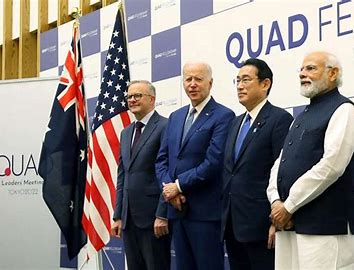At the Quad Leaders’ summit in Wilmington, Delaware, the leaders of India, the United States, Japan, and Australia emphasized the need for significant reforms to the United Nations Security Council (UNSC). They proposed expanding the Council’s permanent membership to include representatives from Africa, Asia, Latin America, and the Caribbean, aiming to make it more representative and accountable.
Call for Comprehensive UNSC Reforms
The joint statement from the Quad summit underlined the necessity of making the UNSC more inclusive, transparent, and effective. It advocated for reforms in both the permanent and non-permanent membership categories to better reflect contemporary global dynamics. This push for change aligns with India’s ongoing efforts, alongside fellow G4 members Brazil, Germany, and Japan, to expand the UNSC and include more nations as permanent members. Indian leaders, including Prime Minister Narendra Modi and External Affairs Minister S. Jaishankar, have consistently raised the issue of UNSC reforms at various UN forums, highlighting the need to accommodate current geopolitical realities.
Concerns Over the Ukraine Conflict
In addition to the call for UNSC reforms, the Quad leaders expressed serious concerns about the humanitarian crisis in Ukraine. They reaffirmed their commitment to upholding international law, territorial integrity, and sovereignty. While not directly naming Russia, they condemned the ongoing violence and stressed the unacceptability of nuclear weapon use or threats. The leaders called for a comprehensive and just peace, emphasizing the negative impact of the conflict on global food and energy security, particularly for developing nations.
Stance on the Gaza Conflict
Regarding the Gaza conflict, the Quad leaders strongly condemned the terror attacks on Israel on October 7 and urged for immediate humanitarian assistance for the affected Palestinian regions. They called for the release of hostages held by Hamas and an immediate ceasefire, stressing the need for adherence to international humanitarian law. The leaders reiterated support for a two-state solution, emphasizing the importance of a sovereign Palestinian state while addressing Israel’s legitimate security concerns.
Regional Security in the Middle East
The statement also addressed security issues in the Middle East, condemning the Houthis’ attacks on commercial vessels in the Red Sea and Gulf of Aden. The Quad leaders warned that these actions pose a threat to maritime safety and destabilize the region.
By addressing these global issues, the Quad leaders underscored their collective commitment to peace, security, and the rule of law in international affairs, while calling for significant structural changes to better equip global institutions like the UNSC to deal with contemporary challenges.

